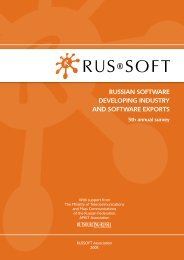russian software developing industry and software exports
russian software developing industry and software exports
russian software developing industry and software exports
Create successful ePaper yourself
Turn your PDF publications into a flip-book with our unique Google optimized e-Paper software.
Chapter 6.<br />
Human Resources <strong>and</strong> the Labor Market Situation<br />
50%<br />
40%<br />
30%<br />
20%<br />
10%<br />
0%<br />
Share of companies which don't have shortage<br />
of personnel by companies' turnover<br />
50%<br />
up to 0.5 MUSD<br />
43%<br />
from 0.5 MUSD<br />
to 4 MUSD<br />
38%<br />
from 4 MUSD<br />
to 20 MUSD<br />
14%<br />
over 20 MUSD<br />
Most wanted specialists in 2008 by companies' location<br />
(frequency of mentioning by companies)<br />
0% 5% 10% 15% 20% 25% 30% 35%<br />
The release of big numbers of <strong>software</strong> developers<br />
from IT departments of different businesses is<br />
confirmed by data submitted by recruitment<br />
agencies. According to HeadHunter (source: CNews<br />
publication) the labor market situation has radically<br />
changed for web-developers <strong>and</strong> Flash-developers.<br />
If in March 2008 the index of dem<strong>and</strong> was 0.24 и<br />
0.22, in March 2009 it was – 2.74 и 1.2. This index<br />
is calculated as the ratio of the number of resumes<br />
sent to recruitment agencies to the number of<br />
vacancies. It follows that is prior to the crisis there<br />
were more vacancies than resumes, now the situation<br />
has reversed.<br />
According to HeadHunter data published in<br />
May 2009 in Vedomosti, in April 2008 the number<br />
of vacancies for С/С++, Java, Delphi, Oracle <strong>and</strong><br />
1С developers twice exceeded the number of<br />
c<strong>and</strong>idates, but a year later the same position is<br />
competed between 3–4 specialists on average.<br />
Developer<br />
(C/C++)<br />
13%<br />
13%<br />
24%<br />
33%<br />
COOPERATION<br />
WITH UNIVERSITIES<br />
Developer<br />
(Java)<br />
Developer<br />
(C #)<br />
Developer<br />
(DB)<br />
Tester<br />
Web-developer<br />
(PHP/ MySQL)<br />
Web-developer<br />
(ASP. Net/ MS SQL)<br />
System<br />
administrator<br />
(Win)<br />
System<br />
administrator<br />
(UNIX)<br />
0%<br />
0%<br />
0%<br />
0%<br />
5%<br />
4%<br />
5%<br />
4%<br />
0%<br />
0%<br />
4%<br />
0%<br />
5%<br />
4%<br />
2%<br />
8%<br />
8%<br />
8%<br />
8%<br />
8%<br />
7%<br />
8%<br />
7%<br />
8%<br />
7%<br />
10%<br />
13%<br />
13%<br />
12%<br />
Moscow<br />
Novosibirsk<br />
21%<br />
20%<br />
21%<br />
St. Petersburg<br />
Others<br />
Due to the decreased dem<strong>and</strong> for staff the<br />
number of companies cooperating with universities<br />
has also reduced. Following the suspension of mass<br />
recruitment of specialists such forms of cooperation<br />
as «Student internship» <strong>and</strong> «Job placement for<br />
graduates» have become irrelevant for many<br />
companies. The conducting of «Training courses for<br />
staff» depends on the volume of new orders <strong>and</strong> in<br />
the context of the crisis has also become less popular.<br />
The share of surveyed companies not cooperating<br />
with universities increased more than twice <strong>and</strong><br />
reached 42%. At the same time absolutely all major<br />
companies continue to work with universities, at least<br />
they practice «Student internship». Nevertheless,<br />
other forms of cooperation («Job placement for<br />
graduates» <strong>and</strong> «Training courses for staff») are also<br />
used by the companies with a turnover over 20 MUSD.<br />
The maximum number of companies that ceased<br />
their contacts with universities is among those with<br />
a turnover from 0.5 MUSD to 4 MUSD. The number of<br />
the smallest companies (turnover less than 0.5 MUSD)<br />
cooperating with universities have even increased<br />
against year-on-year. This may be explained by the<br />
fact that such companies try to save on the salary of<br />
programmers <strong>and</strong> find new employees among students.<br />
The least proportion of such specialists is recorded<br />
in the major companies although they collaborate<br />
with universities most actively (it should be noted that<br />
in absolute value major companies generally recruit<br />
more graduates than any other group of companies<br />
studied here). The largest concentration of graduates<br />
is registered in companies with a turnover from 0.5<br />
MUSD to 4 MUSD, this group being least involved in<br />
cooperation with universities.<br />
Graduates more easily find jobs with companies<br />
primarily oriented at the Russian market rather than<br />
50








